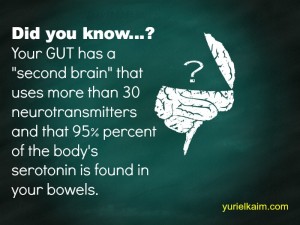The ins and outs of gut health, part one
By Jackie Rainford Corcoran Explore Big Sky Health Columnist
Do you ever have “gut feelings,” “butterflies in your stomach” or feel like you’re in a “sour mood?” These phrases express the connection between the brain and the gastrointestinal tract, or gut.
The gut was nicknamed our “second brain” in 1996 by Michael Gershon, chairman of the Anatomy and Cell Biology Department at New York’s Columbia University Medical Center. Gershon is an expert in neurogastroenterology – a relatively new science that began in the 1990s, which studies brain/gut connections – and author of the book, “The Second Brain.”
There are several intriguing reasons to call the gut our second brain. One is that it begins at the esophagus and ends at the anus and has 100 million neurons, more than the spinal chord or the peripheral nervous system. This allows for digestion and excretion without messages first traveling from the brain through the spinal chord and down. “The brain in the head doesn’t need to get its hands dirty with the messy business of digestion,” Dr. Gershon says.
The gut’s massive neuron count gives it control beyond digestion, as well. Scientists have discovered that the gut also directly influences the brain. For example, 90 percent of the signals passing  along the vagus nerve – which is responsible for the function and regulation of organs like the heart – are actually sent from the gut up to the brain, according to the American Journal of Physiology. It’s now believed that this signaling can affect our mood, and stimulating the vagus nerve is currently being used to treat chronic depression, according to The British Journal of Psychiatry.
along the vagus nerve – which is responsible for the function and regulation of organs like the heart – are actually sent from the gut up to the brain, according to the American Journal of Physiology. It’s now believed that this signaling can affect our mood, and stimulating the vagus nerve is currently being used to treat chronic depression, according to The British Journal of Psychiatry.
Like the first brain, the second brain produces a wide range of hormones and neurotransmitters. In fact, as much dopamine is generated by neurons in the gut as in the head and about 95 percent of serotonin is found in the bowels. It’s worth noting that depression treatments targeting the mind can negatively impact the gut. Antidepressants – which are selective serotonin re-uptake inhibitors – increase serotonin levels, and irritable bowel syndrome is one symptom of having too much serotonin in the bowels.
Neurogastroenterology is proving that mental health and gut health go hand in hand. Anxiety, depression, IBS, constipation and even disorders like autism and autoimmune diseases like Parkinson’s show symptoms at both the brain and the gut level. As this scientific field flourishes, it will likely offer new insights into the second brain’s impact on the mind as well as innovative cures for disease.
Stay tuned for my next article, describing three proven tactics to banish belly bloat.
Jackie Rainford Corcoran is an IIN Certified Holistic Health Coach, a NASM Certified Personal Trainer, public speaker and health activist. Contact her at jackie@thetahealth.org, or find more at thetahealth.org.















